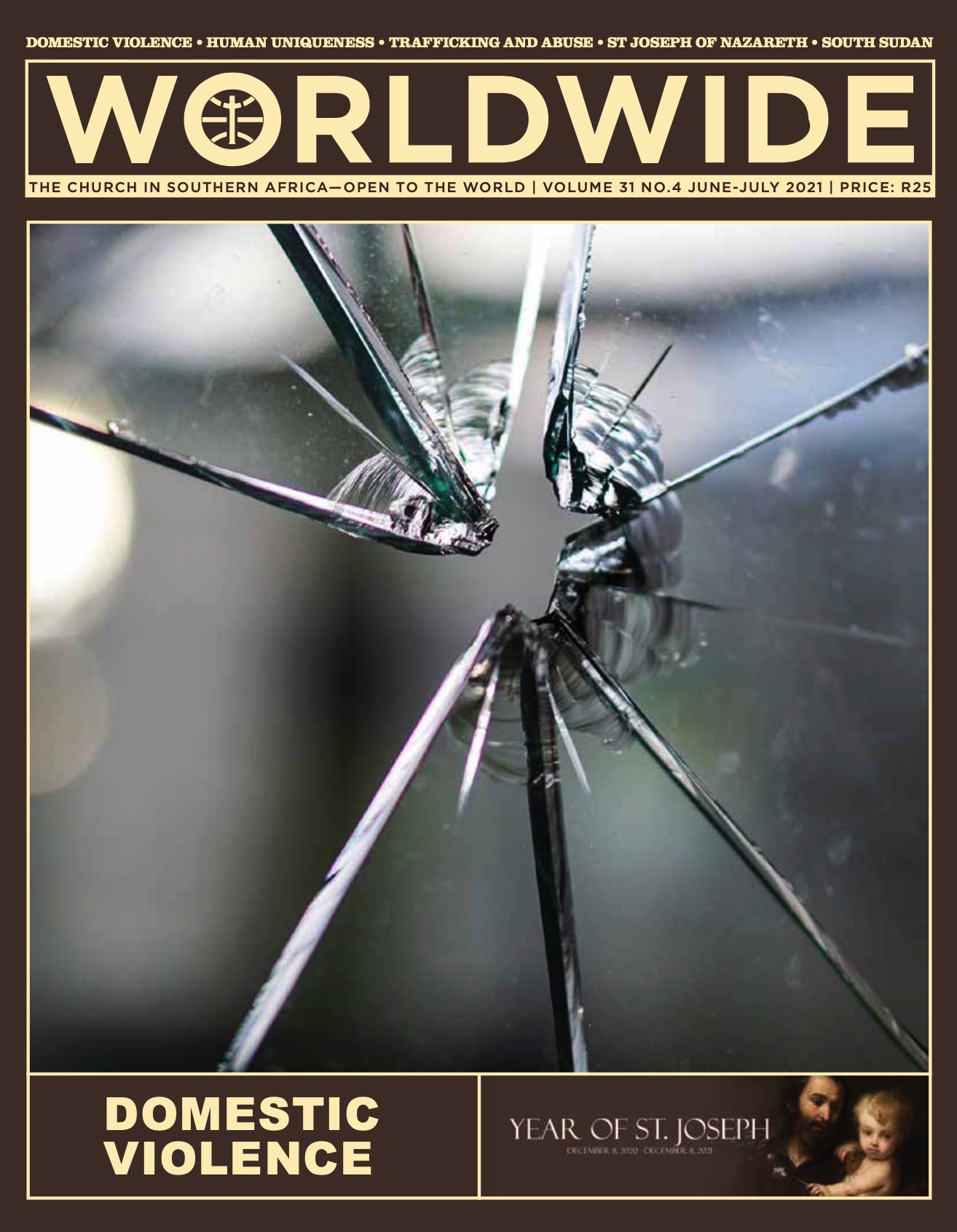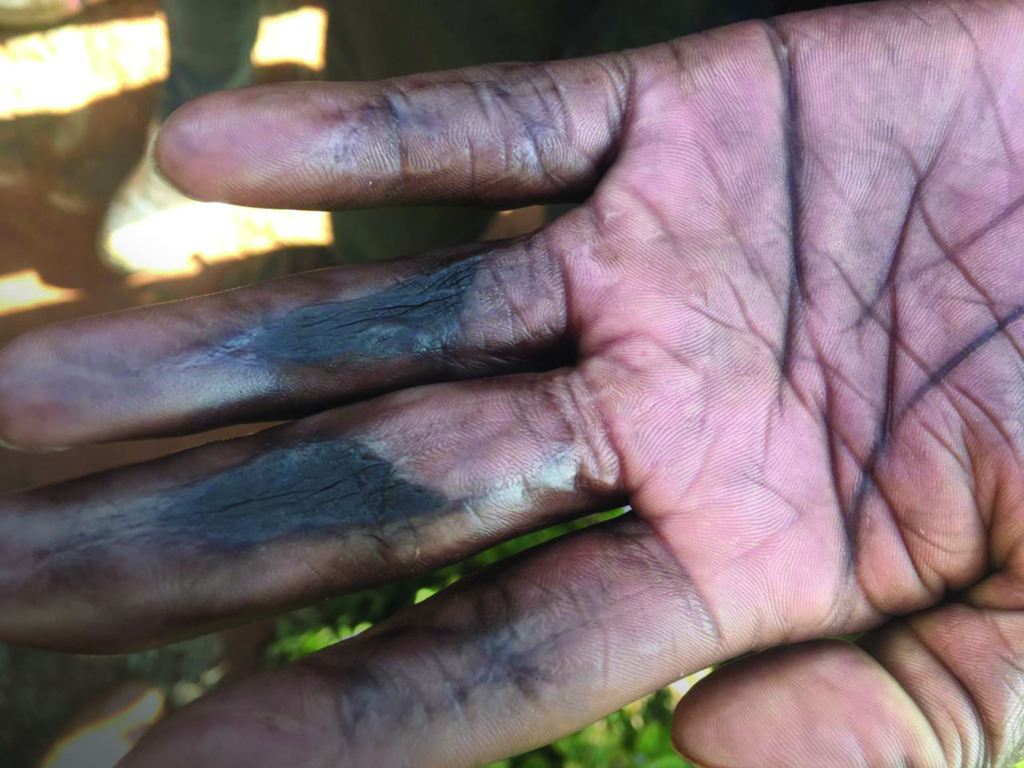
Domestic Violence
The shattered glass represents the broken lives and dreams caused by domestic violence. abuses in families are absolutely contrary to God’s plan of mutual care and fraternity for humanity. domestic violence, inflicted especially upon women and children, is a horrendous scourge. To eradicate it we need to foster the education on values of love, equality, respect and dialogue, in society. The alleviation of poverty, protection of the vulnerable and law enforcement will give the victims the courage to speak out and unveil this atrocious crime.
Challenges • Domestic Violence and Human Trafficking

TRAPS OF POVERTY
The harsh conditions experienced by trafficked immigrants in South Africa
BY
Charles Ephraim Luhanga & Claudius Zindoga
Edited by Fr Rafael Armada
THE REALITIES of human trafficking and domestic violence are intertwined. There are thousands of migrants who arrive to South Africa, mostly from neighbouring countries, victims at their homes of domestic violence and poverty, who try to escape from the direness they are living in. In their attempt to flee from it, they look for better pastures in dream lands. They are given false hopes and promises of decent jobs before departing only to find disillusionment on their arrival
On their journey to South Africa, they often fall prey to unscrupulous transporters and smugglers who abuse them physically and, above all, sexually. Thoroughly cheated, they have to endure traumatic situations on their trip which does not stop on arrival, but rather becomes more distressing. Most of them with their unfulfilled dreams end up in forced prostitution or in the hands of all kinds of abusers.
PIRILANI’S TRUE STORY
Pirilani’s husband’s stay in South Africa was shortened abruptly since he died in a car accident. The funds dried up and Pirilani had to find ways to sustain her six children and attend to the financial obligations that her husband had contracted towards the support of his relatives. She had no other way to meet all these demands but to follow her husband’s destination. “I did not have a passport, but my sister was supportive enough to lend me hers”. Her sister also knew a transporter who agreed to take Pirilani to South Africa and find a job for her in Pretoria, as a helper in the house of a Zimbabwean family. The couple of that family were at the brink of divorcing when Pirilani arrived. Once the wife moved out of the house, the husband, an alcohol and sex addict, started insinuating her sexually, abusing and raping Pirilani as well as threatening to kill her should she report the abuse to anyone. The man would ensure her financial needs at the price of maintaining her subjugated, a victim of untold physical and emotional torture and as his hostage, because of her illegal residence in South Africa.
DAYS OF HELL
“I was living in a house of a monster. I was dealing with a man with issues that were certainly manifesting in my abuse; a man who required serious professional help or simply prison. My days in the household were hell. With nowhere to go, no one to tell and nothing I could possibly do to stop the man, I was mercilessly and relentlessly sexually assaulted”, Pirilani recalls. Finally, she got the courage to share her situation with a fellow countryman living in her neighbourhood, though she felt that any possibility of escape from the house or denouncing her abuser would leave her helpless and her children unassisted back at home. Once, she managed to leave the house and expose publicly in her neighbourhood, the atrocities of the man with whom she was living. However, she finally decided to return to her employer and abuser, for the sake of providing education for her children back in Malawi. As she relates, “my employer had stripped me of my dignity. He carved out all my humanity. I did not feel like a woman anymore. He had taken away all my confidence. He had succeeded in destroying all my dreams and ambitions. Fortunately, a single power remained that he seemed to have failed to take away from me; a power that no man or even any person could take away from me: the power of being a mother. That power was a gift that urged me on”. She decided to put the abuse that she went through behind her and to fight any further abuse. Eventually she managed to return to Malawi where she currently lives and works.
Pirilani’s is one of the many real stories of migrants in South Africa, uncountable victims of the hideous scourge of traffickers and abusers. Her struggles and of many others are narrated in the book, Wamama Chronicles, by Zindonga & Luhanga (2017).
The authors of this book are also the founders of Fula Africa, a non-profitable organization, created in 2017 as a response to the cries, challenges and concerns experienced by large sections of the migrant population in South Africa. Specifically, they look at cases and incidences of trafficking in persons (TIP) and smuggling of migrants (SOM). Most of the victims, particularly women and children, relate gross physical and emotional violence and rights abuses at the hands of traffickers and smugglers.
FULA AFRICA AGAINST TIP AND GBV
Fula Africa recognises that comprehensive efforts to reduce human trafficking must include the prevention and response to gender-based violence (GBV) due to the intertwined relationship of the two crimes. In fact, TIP and GBV share common ground. GBV is both an important driver of human trafficking and a tool to manipulate and control women, children, and even men, into sex work and forced labour across all forms of trafficking. There is a deeply imbedded culture of violence (physical and emotional) within our society that, unfortunately, is enabled and perpetuated by our silence and inaction. Fear, emotional and physical abuse are inherent in both GBV and TIP. Methods of control used in TIP mirror all forms of GBV prevalent in our society. Details of human trafficking and smuggling of persons are exceptionally opaque the world over, as are those of GBV.
Accounts of shocking levels, intensity and forms of abuse and violence meted out to innocent victims include: sale (in routine transactions or to old depraved men of various degeneracies); sexual abuse—with its consequences (HIV/AIDS and unwanted pregnancies); mutilation (butchered for punishment or muti) and other unimaginable forms of physical abuse. The litany of psychological and physical abuse is endless. All of them, acts that reflect a total disregard for the sanctity of life, dignity and rights of others. The harsh realities of silent victims of TIP and SOM allowed us to observe with clarity, a sad and cruel world that punishes one for being a woman, for being poor, for being in an uncompromising predicament or for wishing and aspiring for more.
POVERTY AND VIOLENCE
The South African Development Community (SADC) grapples with a myriad of social, political and economic issues that appear to become more clearly manifest in situations of poverty. In fact, poverty as seen in the case of Pirilani, is a cause denominator in GBV and TIP. It is often the main factor of violence at homes and the fertile soil for TIP and SOM as well. The majority of young trafficked women come from poor backgrounds, often from dysfunctional families and with high levels of domestic violence and substance abuse
There are also social and cultural pressures; the perceived societal subservient role of women in society (conversely, the paternal status of men), the fear of forced marriage, the stigmatisation after a sexual assault and a lack of knowledge of human rights are, among others, some of the factors involved. Poverty has pushed many young girls to escape from their homes only to fall prey to traffickers and to end up in exploitative situations. As in the case of GBV, poverty enables and perpetuates the crime.
Gross violations of GBV and TIP are taking place in plain sight, yet continue to go unnoticed. In the case of GBV, abuses occur in the surrounding neighbourhoods. In TIP, the victims cross provincial, national and regional boundaries. The Covid pandemic has also exacerbated poverty which has fuelled both GBV and the vulnerability to TIP.
SILENCED VIOLATIONS
Fula Africa has over the years borne testimony towards a society that wants to move away from perceiving some of its members as a species being born with a fatal predisposition to withstand any form of mistreatment, manipulation, exploitation and abuse. It is our collective morals and values as well as our natural responsibility and obligation to uphold the dignity and humanity of fellow human beings.
Fula Africa questions the society in which we live: is the eccentric, peculiar and inexplicable, the violence against women and children become the new norm? have we come to accept it as it is and allow to let it go unnoticed? According to the organization’s views, it is embarrassing to belong to this kind of society; a society that appears to be nonchalant in the face of anarchy, an apathetic society in the face of adversity and seemingly deliberate ignorance of the evil in full view. Fula Africa affirms that society’s blindness and unnerving quiet to gross violations of women’s rights is a shame for humanity. This kind of society, in Fula Africa’s perception, is complicit to the crimes with its silence and inaction; this silence has perpetuated heinous crimes and atrocities. The South African law stipulates that an individual is guilty of crime if one does not report an action of TIP or related information. However, the same does not apply to GBV. It remains as a silent crime despite the millions of Rands that the society spends on advertising this deplorable behaviour and the need for its change. However, the reality on the ground is quite diverse and the dawn of a new mentality and a better law enforcement in society remain quite substandard and a challenge so far.
Fula Africa manifests its conviction that upholding and respecting other people’s rights, dignity and humanity (regardless of gender, ethnicity, or nationality) is not only an ideal—rather it is an obligation. Fula Africa explores partnerships through various strategies to fight the causes of GBV, TIP and SOM; fights the associated violence; seeks to protect victims and the vulnerable as well as pursue the perpetrators of the heinous crimes. In this game, we all have a part to play.
